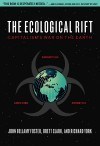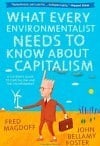The rise in overt militarism and imperialism at the outset of the twenty-first century can plausibly be attributed largely to attempts by the dominant interests of the world economy to gain control over diminishing world oil supplies. Beginning in 1998 a series of strategic energy initiatives were launched in national security circles in the United States in response to: (1) the crossing of the 50 percent threshold in U.S. importation of foreign oil; (2) the disappearance of spare world oil production capacity; (3) concentration of an increasing percentage of all remaining conventional oil resources in the Persian Gulf; and (4) looming fears of peak oil | more…
Paul M. Sweezy was, in the words of his contemporary John Kenneth Galbraith, “the most distinguished of present-day American Marxists.” A Harvard-trained economist, his writings spanned some seven decades from the early 1930s to the closing years of the twentieth century. For more than half a century he was coeditor of Monthly Review, subtitled An Independent Socialist Magazine, which he founded along with Leo Huberman in 1949. Although first and foremost an economist, Sweezy was also a social scientist in a much broader sense. His impact on political science, sociology, history, and other disciplines was profound. He took the entire globe as his field of analysis, helping to enlarge our understanding of imperialism and of the necessity of revolution, particularly in the third world. | more…
With the benefit of hindsight, few now doubt that the housing bubble that induced most of the recent growth of the U.S. economy was bound to burst or that a general financial crisis and a global economic slowdown were to be the unavoidable results. Warning signs were evident for years to all of those not taken in by the new financial alchemy of high-risk debt management, and not blinded, as was much of the corporate world, by huge speculative profits. This can be seen in a series of articles that appeared in this space: “The Household Debt Bubble” (May 2006), “The Explosion of Debt and Speculation” (November 2006), “Monopoly-Finance Capital” (December 2006), and “The Financialization of Capitalism” (April 2007). | more…
Rachel Carson was born just over 100 years ago in 1907. Her most famous book Silent Spring, published in 1962, is often seen as marking the birth of the modern environmental movement. Although an immense amount has been written about Carson and her work, the fact that she was objectively a “woman of the left” has often been downplayed. Today the rapidly accelerating planetary ecological crisis, which she more than anyone else alerted us to, calls for an exploration of the full critical nature of her thought and its relation to the larger revolt within science with which she was associated. | more…
The Research Unit for Political Economy’s (RUPE’s) brief historical account here of the origins of the Marxist theory of imperialism constitutes a crucial corrective to common errors regarding that history. In my article, “The Imperialist World System: Paul Baran’s Political Economy of Growth After Fifty Years” (Monthly Review, May 2007), I began by pointing out that Baran’s book was an outgrowth of classical Marxist thought—the ideas of Marx, Lenin, and Luxemburg. At the same time it represented a sharp departure from the rigid orthodoxy of linear development that had come to characterize so much of socialist (as well as bourgeois) thought—often presented in terms of Horace’s phrase, quoted by Marx, “the tale is told of you.” Baran’s treatment of the imperialist world system was a startling contribution at the time that his book appeared, challenging the conventional assumptions of both the right and an increasingly calcified left. | more…
The introduction to this book, the last part to be completed, was sent to the printer in New York City only days before the attacks on the World Trade Center on September 11, 2001, and was first published in October 2001 in Monthly Review. Since then the world has witnessed a continuing war by the United States for control of the oil-rich Middle East and an acceleration of the global ecological crisis—symbolized above all by global warming. The opening years of the twenty-first century can therefore be viewed as marking a new stage in the war of capitalism on the planet. | more…

Humanity in the twenty-first century is facing what might be described as its ultimate environmental catastrophe: the destruction of the climate that has nurtured human civilization and with it the basis of life on earth as we know it. All ecosystems on the planet are now in decline. Enormous rifts have been driven through the delicate fabric of the biosphere. The economy and the earth are headed for a fateful collision—if we don’t alter course. | more…
The revolt against U.S. hegemony in Latin America in the opening years of the twenty-first century constitutes nothing less than a new historical moment. Latin America, to quote Noam Chomsky, is “reasserting its independence” in an attempt to free itself from centuries of imperialist domination. The gravity of this threat to U.S. power is increasingly drawing the attention of Washington. Julia Sweig, Latin American program director at the Council on Foreign Relations, argues that the twenty-first century is likely to be known as the “Anti-American Century,” marking a growing intolerance of the “waning” U.S. empire. Outweighing even the resistance to the U.S. war machine in Iraq in this respect, Sweig suggests, is the political realignment to the left in Latin America, which, in destabilizing U.S. rule in the Americas, offers a “prophetic microcosm” of what can be expected worldwide. | more…

There is a growing consensus that the planet is heading toward environmental catastrophe: climate change, ocean acidification, ozone depletion, global freshwater use, loss of biodiversity, and chemical pollution all threaten our future unless we act. What is less clear is how humanity should respond. The contemporary environmental movement is the site of many competing plans and prescriptions, and composed of a diverse set of actors, from militant activists to corporate chief executives. | more…
Paul Baran’s Political Economy of Growth After Fifty Years
The concept of the imperialist world system in today predominant sense of the extreme economic exploitation of periphery by center, creating a widening gap between rich and poor countries, was largely absent from the classical Marxist critique of capitalism. Rather this view had its genesis in the 1950s, especially with the publication fifty years ago of Paul Baran’s Political Economy of Growth. Baran’s work helped inspire Marxist dependency and world system theories. But it was the new way of looking at imperialism that was the core of Baran’s contribution. A half-century later it is important to ask: What was this new approach and how did it differ from then prevailing notions? What further changes in our understanding of imperialism are now necessary in response to changed historical conditions since the mid-twentieth century? | more…
Changes in capitalism over the last three decades have been commonly characterized using a trio of terms: neoliberalism, globalization, and financialization. Although a lot has been written on the first two of these, much less attention has been given to the third. Yet, financialization is now increasingly seen as the dominant force in this triad. The financialization of capitalism-the shift in gravity of economic activity from production (and even from much of the growing service sector) to finance—is thus one of the key issues of our time. More than any other phenomenon it raises the question: has capitalism entered a new stage? | more…
I would like to begin my analysis of what I am calling here “the ecology of destruction” by referring to Gillo Pontecorvo’s 1969 film Burn!. Pontecorvo’s epic film can be seen as a political and ecological allegory intended for our time. It is set in the early nineteenth century on an imaginary Caribbean island called “Burn.” Burn is a Portuguese slave colony with a sugar production monoculture dependent on the export of sugar as a cash crop to the world economy. In the opening scene we are informed that the island got its name from the fact that the only way that the original Portuguese colonizers were able to vanquish the indigenous population was by setting fire to the entire island and killing everyone on it, after which slaves were imported from Africa to cut the newly planted sugar cane. | more…
In the 2006 presidential election campaign in Brazil, President Luiz Inácio Lula da Silva (known as Lula), leader of the Partido dos Trabalhadores (PT or Workers’ Party), was interviewed at length on July 11, 2006, by the Financial Times (which also interviewed Lula’s main rightist challenger Geraldo Alckmin). The interview touched on many topics but mainly concentrated on Lula’s adherence in his first term of office to the global neoliberal policies of monopoly-finance capital, particularly repayment of debt and “fiscal responsibility.” At two points in the interview the Financial Times bluntly asked whether Lula was looking toward a “radical change in the model,” i.e., whether he and his Workers’ Party intended to break with financial capital and neoliberalism in his second term of office. Lula gave them the answer they wanted: “There is no radical change in the model….What we need now, in economics and in politics, is to strengthen Brazil’s internal and external security.” | more…

